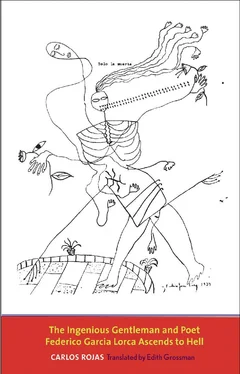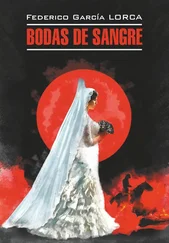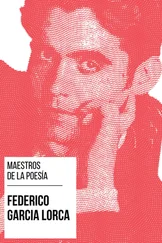“Rafael, Rafael, I have a wonderful idea! I don’t know why I didn’t think of it earlier!”
“What are you trying to do? Demolish Madrid with burning sulfur? Maybe it’s the fate we all deserve.”
“No, no, how awful! I’m not the God of the Old Testament. I’m only an ambiguous creature and a terrified poet. Rafael, come with me to Granada!”
“But, when?”
“Right now. We’ll buy two sleeping-car tickets instead of one. Case closed.”
“You’re out of your mind. Why would I go to Granada? And why this afternoon, for God’s sake?”
“Because I’m inviting you. I’ll pay for everything, including the ticket, naturally. You’ve never been to Granada and it’s high time you saw it. Besides, I need you. I have the feeling that if you’re with me, you’ll change my destiny and make me invulnerable.”
“You’re out of your mind! You think the world owes you everything, as if you were the sorcerer’s apprentice.” Little by little, Martínez Nadal was growing irritated with you, but you didn’t become angry or restrain yourself. You were only overcome by an infinite fatigue, because even his reaction to your proposal had been seen earlier. “I’m going to decide to take a trip right away because you order me to! Just like that, just the way it sounds, and only to please you. I don’t know what to call it!”
The taxi stopped in front of Cook’s, on one shore of the Gran Vía. You paid the fare while Martínez Nadal continued his oration. He spoke now just to hear his own voice, and you didn’t listen. You once believed or believed again that this was the world, or at least the country: a chorus of lunatics talking to one another and never hearing anything.
“It’s all right, man, it’s fine. It doesn’t matter,” you lied. “We’ll go to the Huerta de San Vicente another time. Forgive me if I’ve offended you in any way.”
You took his arm and you both went into Cook’s. When you gave your name so they’d extend a very British welcome, the open-mouthed clerk looked you up and down. Were you the poet? We’re all poets in our own way. He was referring to the poet and playwright, the one who wrote Yerma. Damn, what a play! He had seen it three times! We’re all playwrights in our dreams. Did you ever stop to think about that? No, it hadn’t occurred to him, but he persisted in his questioning. Were you or were you not the poet of “The Unfaithful Wife” and the author of Yerma ? No, you were only your brother’s brother. Rafael Martínez Nadal laughed, looking aside, leaning his elbows on the counter. He had reconciled with the sorcerer’s apprentice almost without realizing it. Now more than ever he reminded you of a sheep about to change into a man. You thought about old verses of yours, scrawled in New York just as you left that black church service (“Go down, Moses! Go down, Moses!”). You bore witness there to the effort in each metamorphosis. The interminable attempt of the horse to be a dog, of the dog to change into a swallow, of the swallow to become a bee. And finally, closing the dance of life, of the bee to transform into a horse. This was the idea of the poem, though you had forgotten the verses, if you ever knew them by heart. The boy in Cook’s did not come out of his distressed astonishment. “Excuse me, I’m afraid I don’t understand. Are you the brother of your brother?” Without answering you said goodbye, sweeping the air with a gesture. Outside you saw the same taxi that had taken you from Puerta de Hierro to Cook’s (or from Cook’s to this theater in hell), its flag lowered. You climbed in and gave your address, Alcalá, 102.
You never learned how to pack. When you went to the Huerta de San Vicente from Madrid, you tended to travel with your hands in your pockets. This time you were resigned to dragging a suitcase to avoid a scandalized uproar from Rafael Martínez Nadal. He took charge of collecting your things, while you told him yes, you see, so much running around the world the past few years and you’d put old shoes with new shirts. Or you’d go with a toothbrush in the breast pocket of your jacket. A red brush, with hard bristles, like the orchid George Carpentier always wore in his lapel. You know. At the door of your house, beside the sidewalk on Alcalá, stood the same taxi. Stopped at the edge of traffic, it wasn’t waiting for the two of you or anyone else. One might say it had come miraculously from a space without time to take you to an ineluctable destiny. Like the gondola Gustave Aschenbach, or von Aschenbach, takes when he arrives in Venice. When he is unaware that his days are numbered and that before he dies he will experience love, always incomprehensible, for a seraphic adolescent. Though you confessed nothing to Rafael, you would have sworn that the taxi and its driver were strangers in Madrid and had never appeared in any company, registry, or union. Just like Aschenbach’s gondola, yes, with its nameless rower (“I’m only the brother of my brother”), or with a name the other gondoliers never learned. “The gentleman will pay,” that brutal-looking, distant creature had said to Aschenbach when he asked to be taken to the Lido. Nevertheless, as soon as they arrived, man and boat surprisingly disappeared, as if they had slipped away through the air and not the turbid waters of the canal. Gustave Aschenbach or von Aschenbach could not pay for the service, though his debt, incomprehensible to implacable creditors, still stood.
“Rafael … ”
“What’s on your mind now?”
“I forgot the cup on the balcony again when I was in the house.”
“Sweet Jesus! What are you talking about? I don’t understand a word!”
“An empty coffee cup. It was left on the balcony when you came by. Then I was distracted while I said goodbye to that actor who boasted of being a descendant of Máiquez by way of a sister, and I forgot about it again a second time until now.”
“You’re incomprehensible.” The small-eared sheep smiled in the back of the taxi. “Simply incomprehensible.”
“Why is that?”
“On one hand, you predict a war and say it will devour you as soon as it begins. On the other, you worry about a cup left on the balcony of your apartment.”
“It’s all tragically joined,” you answered, surprising yourself. “Rafael, these streets and the countryside around Madrid will fill with corpses covered in their own blood. This city will be shelled and bombarded until many of its neighborhoods crumble into ruins. Yet I sense too that the cup will remain intact, on my balcony, through all the catastrophes.”
Martínez Nadal was silent now. You imagined him deep in thought, trying to imagine your words without understanding them, assailed by another man’s imaginings. In the meantime, the afternoon fled up among the roofs, as in some paintings by Pissarro. Thinking about your dream the night before, you wondered whether by chance everything we thought alive were actually printed. In other words, did we really exist as beings doomed to die, or were we conscious images in someone else’s painting? You rejected the idea, shaking your dark head that, behind your back, people said looked like a farmhand’s. Everyone’s destiny was as inexorable and irrevocable as the course of the river, its sources hidden beyond nothingness, which for want of another name people called time. But in paintings, as in dreams, its water and the hours did not flow by. Everything was immobilized on canvases, Van Gogh’s hurricanes, Monet’s water lilies, and Velázquez’s exceedingly slow ladies-in-waiting.
And at that instant, in a kind of sudden revelation, you thought you understood hell.
It couldn’t be anything but the previous night’s dream, which you also foresaw as your last. Until your death, anticipated with a cold, almost inhuman lucidity, you would sleep blind and in pitch darkness. But you would not forget that nightmare, the sum of all you had lived and dreamed, and at the same time a very accurate foreboding (that, at least, is what you believed then) of endless hell, which would be nothing but the interminable presence of incomprehensible images, surrounding you and settling inside you forever. There, in you and with you, the shell opened with a barber’s razor, the goddess cut off from her breasts down, and the appeal adhering to the shell with its long red and gray turns. The fossilized eye of a species earlier than our own, turned into the blue heart of another mother-of-pearl shell. The gigantic yellow ape, its eyes like turquoises, squatting under a transparent burden before cliffs cut by a pickax. The hacked torso of the nude, apple in hand, which even in the dream you attributed to another of the Graces. The white Bally shoe and the onyx slipper snail, lost at the bottom of your nightmare and watching over Paris’s rest.
Читать дальше












